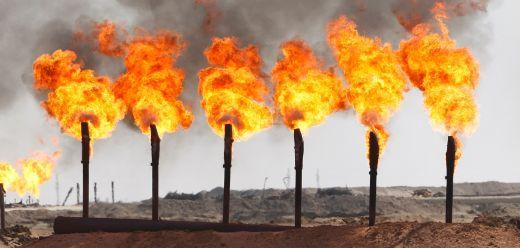Nigeria’s onshore gas flaring has surged despite multiple regulatory crackdowns, pushing the country to second place globally in volume increase, according to the World Bank’s 2024 Global Gas Flaring Tracker Report.
Between January and May 2025, Nigeria lost approximately 15,400 gigawatt-hours (GWh) of potential power generation due to gas flaring—representing a 17.5 per cent rise from 12,700 GWh lost in the same period in 2024. Data from the National Oil Spill Detection and Response Agency (NOSDRA) showed that 539.2 million standard cubic feet (mscf) of gas were flared during the five-month period, with an estimated monetary value of $154.1 million.
NOSDRA said the offending oil firms, including international oil companies (IOCs), incurred fines totalling $308.1 million (about N318.3 billion) under the current gas flaring penalty regime. The agency attributed the persistent flaring to weak enforcement and delayed implementation of commercialisation projects, despite Nigeria’s longstanding anti-flaring policy.
According to NOSDRA, onshore gas flaring accounted for the bulk of the emissions, rising by 10 per cent to 102.4 mscf, compared to 51.7 mscf from offshore fields. The agency said the volume flared during the review period equates to about 8.2 million tonnes of carbon dioxide emissions.
“Despite concerted efforts to eliminate routine flaring, the practice has persisted in Nigeria since the 1950s,” NOSDRA said. “The environmental and economic consequences continue to be enormous.”
The World Bank’s report placed Nigeria behind only Iran in the global ranking of countries with the largest flaring increases in 2024. The Bank noted that Nigeria’s flaring volume rose by 12 per cent, while oil output rose by only 3 per cent, leading to an 8 per cent increase in flaring intensity.
“This marks the second consecutive year of rising flare levels in Nigeria,” the World Bank stated. “Facilities operated by the Nigerian National Petroleum Corporation Limited (NNPCL) and smaller companies accounted for 60 per cent of the country’s flaring and 75 per cent of the increase.”
Along with Nigeria, the top five countries with the largest increases in flare volumes in 2024 were Iran, the United States, Iraq, and Russia.
In response to the worsening trend, the federal government has renewed focus on the Nigeria Gas Flare Commercialisation Programme (NGFCP), which is expected to attract investments of up to $2.5 billion. According to the Nigerian Upstream Petroleum Regulatory Commission (NUPRC), the programme is designed to monetise flare gas through third-party investors and technology providers.
Chief executive of NUPRC, Gbenga Komolafe, said the programme is part of a wider gas-centric transition strategy aimed at ending routine flaring by 2030 and reducing methane emissions by 60 per cent by 2031.
“Through the NGFCP, approximately $2.5 billion in investment will potentially be unlocked, generating significant revenue and employment opportunities,” Komolafe said. “We are also aligning the programme with broader ESG objectives and decarbonisation goals.”
Komolafe noted that the Commission has developed an Upstream Decarbonisation Framework integrating emissions tracking, monitoring, reporting, and verification (MRV) systems, as well as carbon capture, utilisation, and storage (CCUS) initiatives.
In March 2025, the Commission launched the Decarbonisation and Energy Sustainability Forum, an annual platform for tracking emissions reductions and promoting knowledge-sharing among stakeholders.
Minister of state for environment, Dr. Iziaq Salako, also reaffirmed the government’s commitment to methane mitigation in collaboration with NOSDRA. He said the agency has begun stakeholder consultations to integrate methane management into regulatory enforcement.





